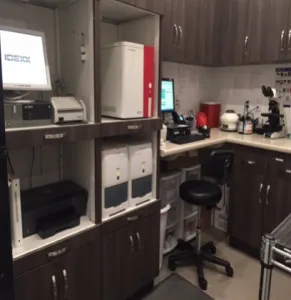Our in-house laboratory allows us to perform many types of testing that can aid in the diagnosis and treatment of your pet. Our state-of-the-art, in-house laboratory equipment allows us to receive accurate results available in minutes. An important member of our team is our Laboratory Technician, who is able to perform these diagnostic tests for our veterinarian while your pet is being treated on an outpatient or hospitalized basis.
Laboratory testing is an integral part of veterinary diagnostics, as it provides our veterinarian with vital diagnostic information, as well as the ability to perform wellness tests to determine if there is any underlying illness and set a baseline for the patient to reference in the future.
Our lab at Nature Coast performs tests such as:
- Wellness blood panels
- Coagulation profiles
- Routine heartworm testing
- Feline Heartworm
- Blood smears
- Urinalysis
- Skin scrapes
- Test for viruses (Parvovirus, Feline Leukemia Virus, and Feline Immunodeficiency Virus)
- Lyme Disease, Anaplasmosis, and Ehrlichia
- Glucose
- Fecal examinations (testing for the presence of hookworms, whipworms, tapeworms, and roundworms)
- Ear cytology
- Skin cytology
- Complete blood counts
- Chemistry Panels
- Thyroid Testing
- Pancreatic Function
- Advanced Kidney Function testing
- Same-Day Results
Blood work and your pet
Pets can’t say how they’re feeling—it’s usually how they look or act that tells you something is wrong. You play a key role in helping your pet combat illness and stay as healthy as possible. Awareness of the warning signs and regular preventive health screens, including a physical exam and blood work, are the best ways to ensure your pet lives a long, healthy, and happy life.
When Is Blood Work Necessary?
- Sick and emergency situations. Blood work provides you with a valuable picture of your pet’s health and is often the first step when pets are brought in to a clinic because they are sick or in an emergency situation. It helps the veterinary staff make immediate decisions, so they can quickly help your pet.
- Preanesthetic testing. Blood work is routinely done prior to your pet’s surgery, dentistry, or other procedures that require anesthesia. It lets the veterinary staff know if anesthesia is safe for your pet and allows them to plan different anesthetic protocols if they see anything abnormal.
- Preventive care screening. Because the signs that your pet is sick are not always obvious, preventive care testing is often recommended as part of your pet’s annual exam. Preventive care screening not only uncovers disease before it’s too late but can also help you avoid significant medical expenses and risks to your pet’s health.
- Medication monitoring. Some medications can have side effects. Periodic blood work while your pet is being treated can find these problems early and allow your veterinarian to make necessary changes. With other medications, blood tests are needed to ensure that the dosage is appropriate.
What Tests Might My Veterinarian Run?
- A complete blood count (CBC) tells you if your pet has an infection, if inflammation is present, or if your pet is anemic.
- A complete blood chemistry panel including electrolytes provides information about your pet’s liver, kidneys, and pancreas, as well as other functions of the body, such as blood sugar and hydration.
- A urinalysis identifies an infection or inflammation in the urinary tract as well as kidney disease.
- A thyroid function test detects whether or not your pet’s thyroid gland is functioning properly. Thyroid disease is very common in older cats and dogs.
Your veterinarian may recommend additional tests.
When Can I Expect Results?
Many of the tests routinely recommended can be performed in-clinic, providing results quickly and allowing for immediate treatment of your pet. In-clinic blood testing also lets you be more involved in your pet’s care, since you can discuss test results with your veterinarian while you’re still at the clinic. Normal results can rule out certain diseases immediately, so you can worry less. If results are abnormal, your veterinarian can make fast decisions about next steps, including treatment and additional tests. This saves you time as well as trips back and forth to your veterinarian, and gives you answers that will help your pet right away.

